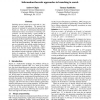Free Online Productivity Tools
i2Speak
i2Symbol
i2OCR
iTex2Img
iWeb2Print
iWeb2Shot
i2Type
iPdf2Split
iPdf2Merge
i2Bopomofo
i2Arabic
i2Style
i2Image
i2PDF
iLatex2Rtf
Sci2ools
ATAL
2006
Springer
2006
Springer
Information-theoretic approaches to branching in search
Deciding what to branch on at each node is a key element of search algorithms. We present four families of methods for selecting what question to branch on. They are all information-theoretically motivated to reduce uncertainty in remaining subproblems. In the first family, a good variable to branch on is selected based on lookahead. In real-world procurement optimization, this entropic branching method outperforms default CPLEX and strong branching. The second family combines this idea with strong branching. The third family does not use lookahead, but instead exploits features of the underlying structure of the problem. Experiments show that this family significantly outperforms the state-of-the-art branching strategy when the problem includes indicator variables as the key driver of complexity. The fourth family is about branching using carefully constructed linear inequality constraints over sets of variables.
ATAL 2006 | Entropic Branching Method | Intelligent Agents | State-of-the-art Branching Strategy | Strong Branching |
| Added | 20 Aug 2010 |
| Updated | 20 Aug 2010 |
| Type | Conference |
| Year | 2006 |
| Where | ATAL |
| Authors | Andrew Gilpin, Tuomas Sandholm |
Comments (0)

